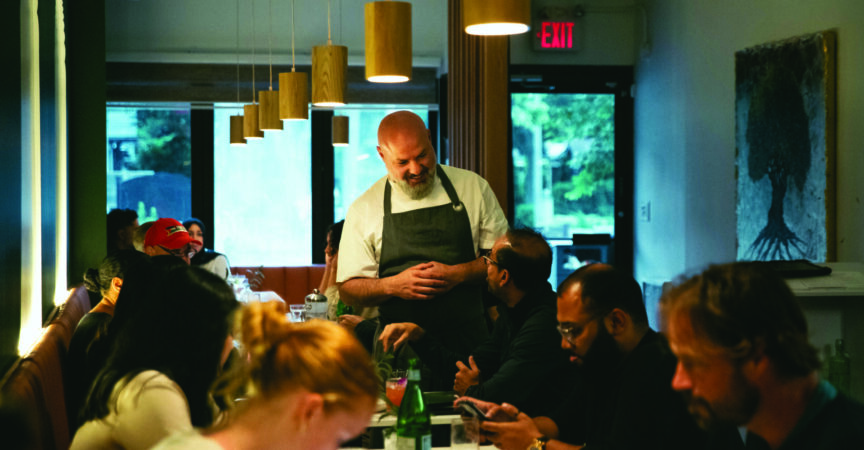Arbequina: Inspired by Love, Levantine Cuisine & Local Food
Nestled in the heart of Toronto’s Roncesvalles Village, Arbequina Restaurant is more than just a new dining destination—it’s a bold reimagining of Levantine cuisine, brought to life by Chef Moeen Abuzaid and his wife and business partner, Asma Syed. Together, they have crafted an experience that seamlessly merges rich cultural heritage, fine dining and local cuisine.
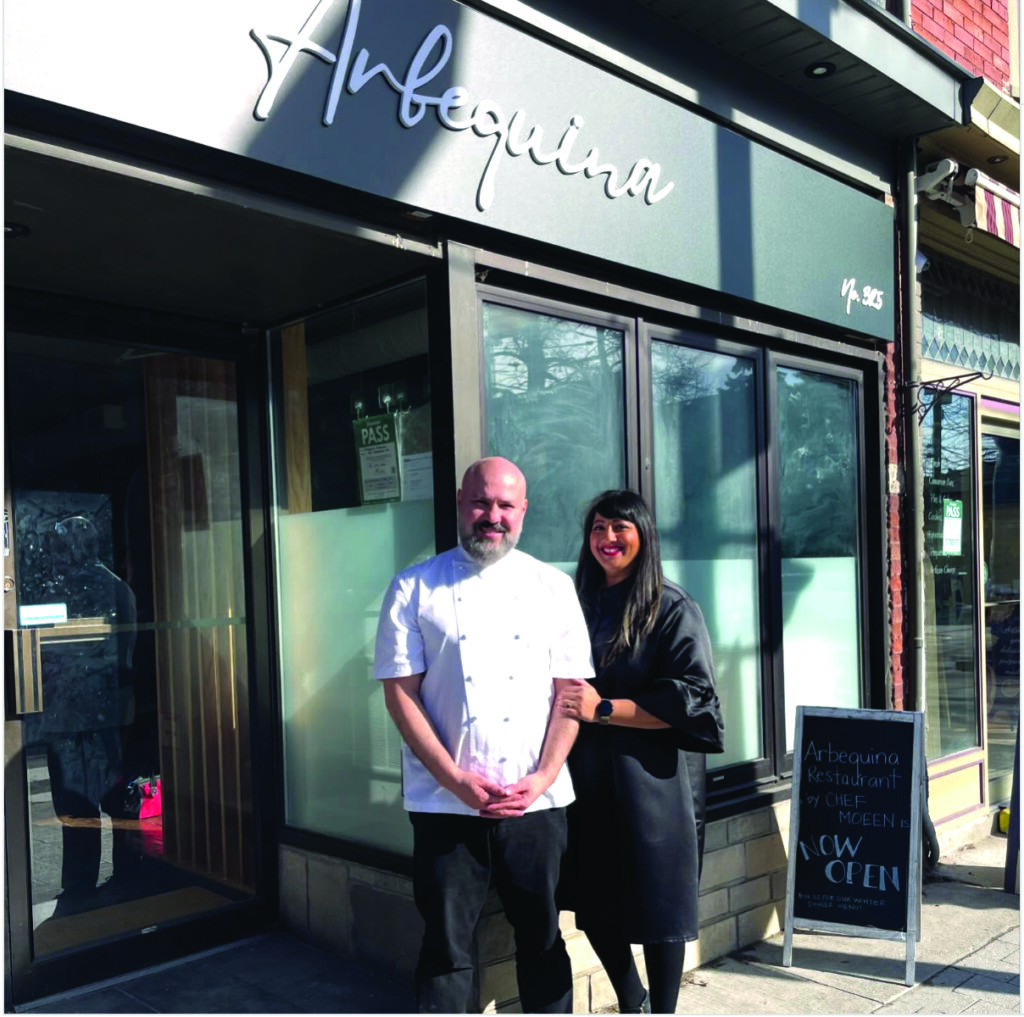
For Chef Moeen, the journey to Arbequina began far from Toronto, in the bustling kitchens of Amman, Jordan. With little more than ambition and a dream, he moved to New York City in 2009, where he worked alongside some of the world’s most revered chefs. There, he honed his craft, pushing the boundaries of Levantine cuisine with a fresh, international approach. From his acclaimed NYC pop-up, The Broken English, to his arrival in Toronto in 2019, Moeen’s vision has been clear: to elevate his cuisine on a global stage while honouring its deep-rooted traditions.
Asma’s path was equally unconventional. A Toronto native, she built a career working with the United Nations. Her background in international development and operations gave her a unique perspective on the intersection of culture, business, and sustainability. When she met Moeen in New York, their connection was immediate, and Asma now plays a pivotal role in the restaurant, managing everything from finances and hiring to branding and logistics.
At Arbequina, that vision is reflected in every detail. The menu is a testament to sustainability, built on seasonal, locally sourced ingredients, many of which come directly from their own garden. In a bold departure from industry norms, the restaurant also operates as a zero-proof establishment, crafting sophisticated non-alcoholic beverages designed to enhance the dining experience. Here, food isn’t just nourishment—it’s storytelling, innovation, and community in every bite.
Together, Moeen and Asma have navigated the challenges of breaking into Toronto’s tight-knit food scene, carving out a space where tradition meets modernity. Their journey—one of risk, reinvention and resilience—is the foundation of Arbequina.
MENU: You and Moeen took an unconventional path to opening Arbequina—meeting online, marrying within three months, and eventually launching the restaurant together. How did your backgrounds and that whirlwind journey shape the vision for your business?
Asma: Our story has always been fast-paced and a little bit fated. I was living in Copenhagen, working for the UN, travelling to over 37 countries, living my best life. Then I moved to New York for a year and met Moeen online. We got married three months later. I didn’t even realize until after we were married just how much of a reputation he already had in the culinary world.
What really connected us was this shared sense of adventure and purpose. Moeen was born in a refugee camp, took risks and worked his way up in some of the world’s best kitchens—he had this incredible talent that was recognized by top chefs globally. I had spent my career working in HR and the development, sector, seeing firsthand how resilience and perseverance can shape people’s lives. When we moved to Toronto, we always knew we wanted to open something of our own. But it took time because we did it independently—no investors, no shortcuts, just us putting everything into it. And when we found our space, it was owned by a husband-and-wife team, just like us. That felt like a sign.
For us, Arbequina isn’t just a restaurant—it’s the result of two people with completely different backgrounds coming together to create something new, something that didn’t exist before. And that’s exactly what we wanted.
MENU: Breaking into Toronto’s food scene can be challenging, especially for chefs coming from international markets. What has that experience been like since opening last year?
Asma: It’s been one of the biggest challenges, honestly. When Moeen arrived in Toronto, a lot of people assumed he was just starting out, like he was a “new” chef, without realizing the incredible work he had already done in New York and internationally. He’s incredibly humble, so he’s not the type to go around saying, “Look at my résumé,” but the reality is, he had already established a name for himself long before coming here.
Toronto’s food industry can feel very insular. People have their networks—their circles—and it’s not always easy to break into that. But, we’ve found people who appreciate innovation and passion, and they’ve been incredibly supportive. A great example is how we connected with Restaurants Canada—a member of their team who lived in the neighbourhood happened to walk by when we were still under construction, knocked on our door, and we invited her in to see what we were building. That conversation opened up so many doors for us.
We believe in what we’re doing, and we know that it takes time to build a real, lasting presence. What matters most is that our guests recognize the experience we’re creating at Arbequina—and that’s what keeps us going.
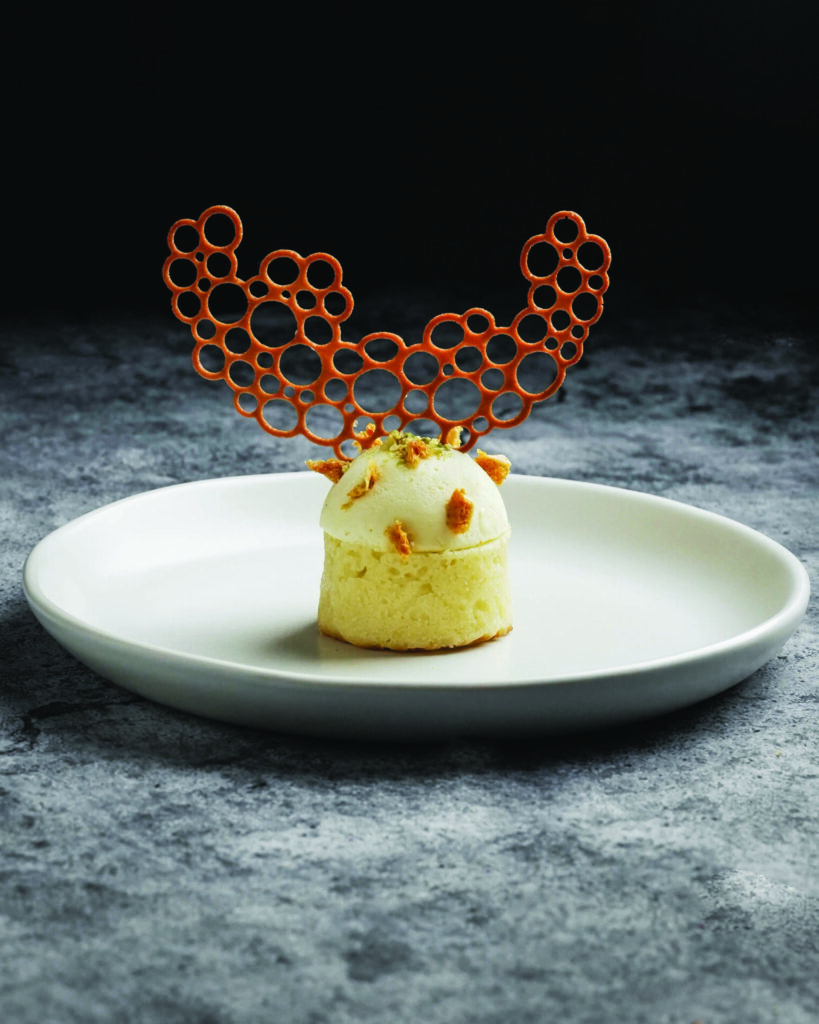
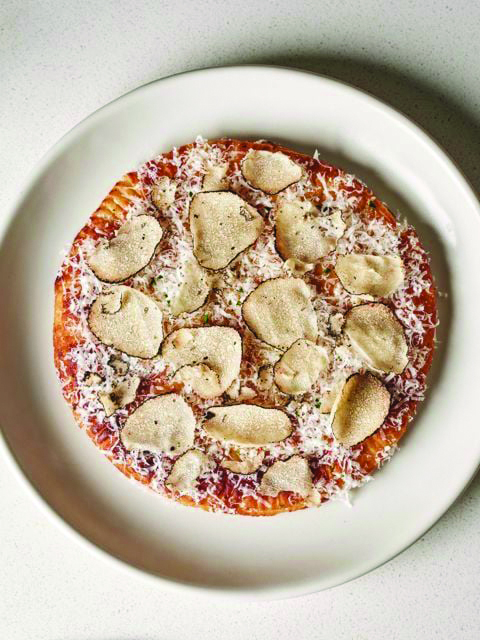
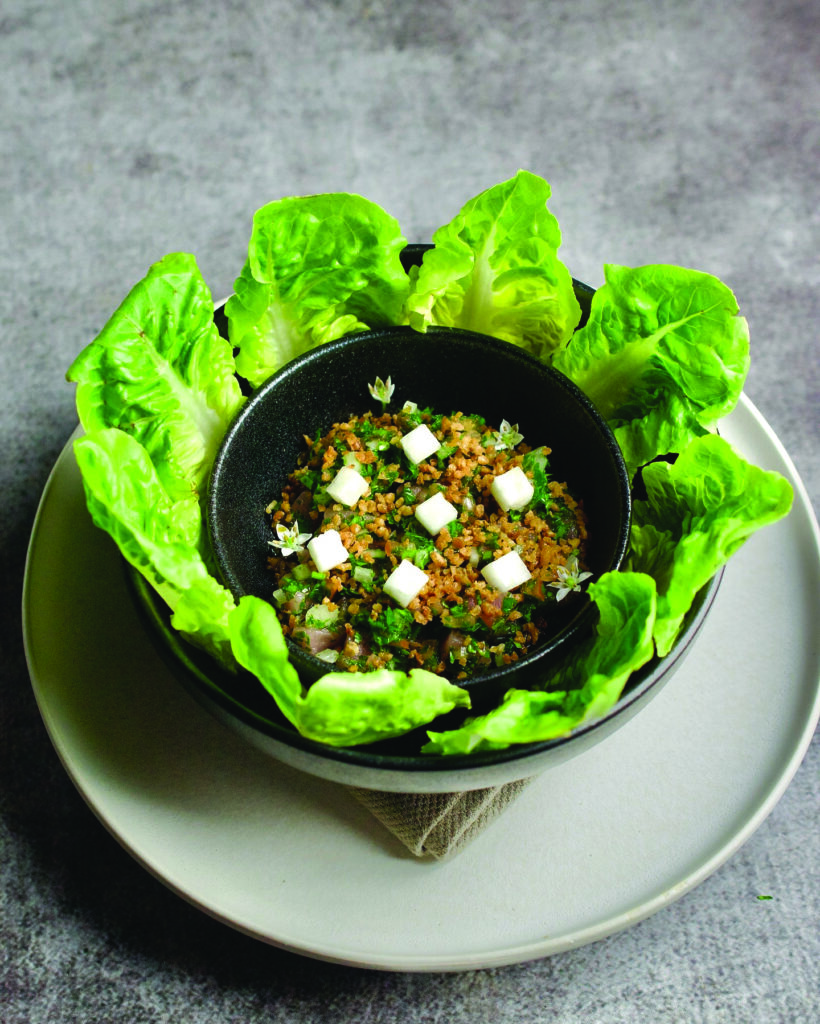
MENU: Moeen, you’ve cooked in some of the world’s most prestigious kitchens. How does Toronto’s restaurant scene compare? What unique strengths or opportunities do you see in the city’s evolving culinary landscape?
Moeen: I have observed that Toronto’s restaurant scene is a dynamic, evolving tapestry—one that I’m still learning to navigate. Coming from the middle east and NYC, I’m sure my perspective on food is different. Toronto is a city of possibilities; I think there is a lot of untapped potential here; an opportunity to embrace the bold and innovative. The city seems ready for it. This is what makes Toronto so exciting. Its diversity and raw energy create a fertile ground for transformation. Every day, I see opportunities to push boundaries, refine our approach, and elevate the culinary conversation.
I’m here to contribute to this culinary landscape and dialogue, to learn, and to inspire others to imagine what’s possible. In this city, where every day is a new discovery, I’m excited to be part of shaping a future that’s as innovative and vibrant as the community itself.
MENU: Chef Moeen, you’ve worked in world-renowned kitchens and have a deep appreciation for global flavours and culinary techniques. How do you balance honouring traditional Levantine cuisine while innovating in a way that excites a Toronto audience—and yourself?
Moeen: My approach to cooking is deeply rooted in the soul of Levantine cuisine, but I see food as an ever-evolving art form. The Levant has a rich history of flavour, technique, and storytelling, and I honour that by sourcing high-quality ingredients, respecting traditional methods, and celebrating the essence of the region’s dishes.
At the same time, my experiences and exposure to global culinary techniques inspire me to push boundaries. Toronto is a dynamic, diverse city with a food culture that embraces creativity, and that excites me as a chef. At Arbequina, I balance tradition and innovation by reimagining familiar flavours in unexpected ways—refining classic dishes with modern plating, using local and sustainable ingredients in traditional preparations, and applying advanced techniques that enhance Levantine flavours without
compromising their integrity.
This is not fusion—it’s innovation. It’s about evolving Levantine cuisine in a way that feels both deeply familiar and entirely new, while staying true to its roots. My goal is to create food that resonates emotionally, surprises the palate, and tells a story of both heritage and discovery.
MENU: Halal fine dining is still a relatively new concept in Canada. What challenges have you faced in shaping this experience, and how do you see the perception of halal cuisine evolving in the fine-dining space?
Moeen: I’m really glad you asked this question. It’s important to clarify that ‘halal fine dining’ isn’t a concept—halal is not a cuisine, nor does it define a particular dining style. It simply refers to the way meat is sourced and prepared.
Arbequina is an upscale dining restaurant that happens to serve only halal meat. This decision doesn’t shape or limit my vision in any way—it only ensures that more people can experience the food I create. The flavours, techniques and creativity remain the same, and the integrity of my dishes is never compromised.
I think the conversation around halal in fine dining is evolving, and I welcome that. It’s moving away from being seen as a limitation and instead being understood for what it really is—an inclusive sourcing choice that allows more guests to feel welcome at the table. In the end, great food is great food, and that’s what truly defines the dining experience.
MENU: Chef Moeen, you’ve mentioned that you’re inspired by traditional techniques but don’t want to be confined by them. Can you share an example of a dish at Arbequina where you’ve taken a classic concept and given it an unexpected twist?
Moeen: For me, I don’t feel confined by the traditions. To me, it’s about understanding the depth of tradition and using it as a foundation for creativity. At Arbequina, we honour classic Levantine flavours while reimagining them in ways that feel fresh and exciting. I’ve had someone tell me that the flavours in their mouth reminded them of home.
One example is our Truffle and Mushroom Mutabbaq with Smoked Kashkaval and Lemon. Mutabbaq is traditionally a stuffed and folded pastry, often filled with spiced meat or cheese. We’ve taken this classic and refined it by using earthy truffles and mushrooms, elevating the richness with smoked Kashkaval cheese, and balancing it all with a bright hit of lemon. The result is something deeply familiar yet entirely new—a dish that feels rooted in tradition but speaks to a more modern, refined palate.
For dessert, our Baklava Mousse with Booza and Pistachio plays on nostalgia while defying expectations. Baklava is known for its crisp, syrup-soaked layers, but instead of simply serving it as is, we transform its essence into a delicate mousse, capturing its flavours in an airy, luxurious texture. The addition of Booza, a traditional stretchy Middle Eastern ice cream, ties it back to its roots, while pistachios add the signature crunch.
These dishes reflect what excites me most about cooking—taking something people think they know and giving it an unexpected, memorable twist.
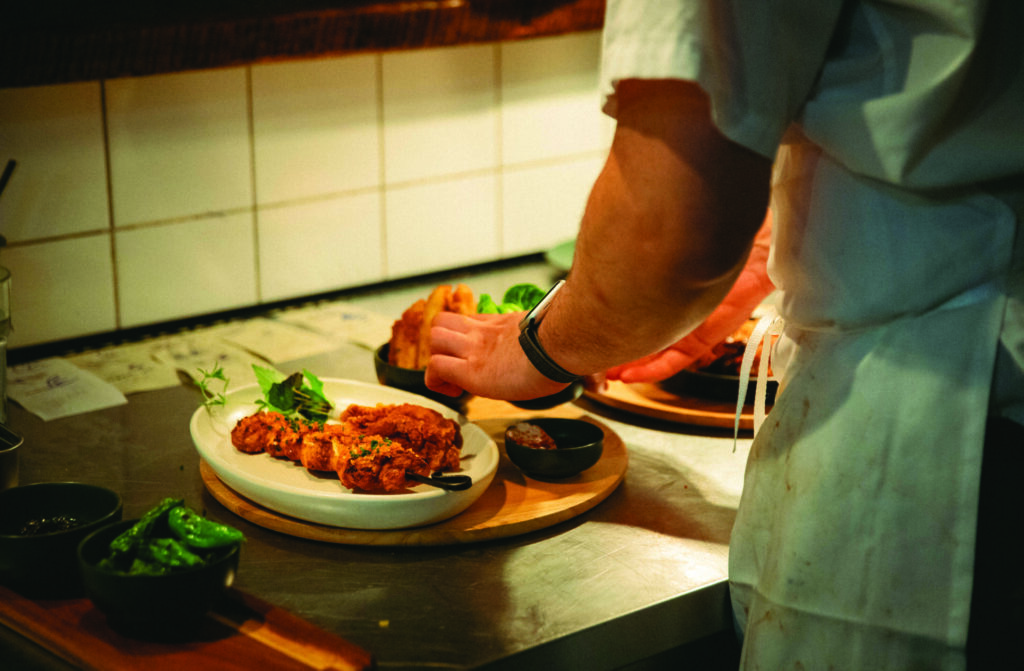
MENU: The definition of “Canadian Cuisine” has long been a topic of significant debate and evolution. Where do you see Middle Eastern gastronomy fitting into this story?
Moeen: As someone who arrived in Canada just five years ago and has spent 15 years on this continent, I don’t know if I would try to define Canadian cuisine. What I do see is a country that beautifully celebrates the diversity of the people who live here. The food landscape is shaped by so many cultures, histories, and influences, and that’s what makes it special.
Middle Eastern cuisine has naturally become part of this evolving story, just as so many other global cuisines have. The spices, techniques, and traditions we bring with us add to the broader culinary fabric of this country. As for halal, I think it’s important to clarify that halal gastronomy isn’t a thing, it’s not a cuisine—it’s simply a way of sourcing and preparing meat. The focus, instead, should be on how Middle Eastern gastronomy continues to be expressed, appreciated and celebrated in Canada.
I respect and admire those who have been part of defining Canadian cuisine, and I celebrate the many ways people choose to interpret it. What makes Canada’s food culture so beautiful is its openness—the way it makes space for so many traditions to coexist, evolve, and thrive. I’m happy to be part of the cooking here and to make to my contributions to this story.
MENU: Having worked in high-pressure, Michelin-starred kitchens, how do you approach mentorship and kitchen culture at Arbequina? What lessons from your past experiences have influenced how you lead your team?
Moeen: I view mentorship as an essential ingredient in creating a thriving culinary family. My time in high-pressure, Michelin-starred kitchens—especially working with visionaries like Wylie Dufresne at wd~50 in New York—taught me that excellence isn’t just about technical precision; it’s also about kindness, support and the willingness to learn.
When I first arrived in New York City in 2009 as a non-English speaking immigrant, I had to hustle, observe, and absorb everything around me. That experience instilled in me the importance of a learning environment with high expectations, where every member of the team is given the space to grow, make mistakes, and ultimately excel.
At Arbequina, I strive to build a kitchen culture that feels like an extension of home—a family where each person is valued and supported in their personal and professional journey. I want to inspire excellence not just through our dishes, but through the way we work together. Whether it’s tailoring guidance to individual dreams or mitigating some of the challenges I once faced, my goal is to empower every member of my team to become not only a skilled chef but also a leader in their own right.
In our kitchen, excellence and kindness go hand in hand. That’s the legacy I want to pass on, ensuring that every person who walks through our doors has the opportunity to thrive.
MENU: Arbequina offers a dining experience without alcohol—how do you approach crafting zero-proof cocktail pairings that enhance the meal just as much as wine or cocktails traditionally would?
Moeen: We view the absence as an opportunity for creative expression. Our zero-proof cocktail pairings are crafted with the same passion and precision as traditional wine or spirit selections. We invest time in reading, researching and testing flavours from around the world. We distill our own unique flavour extracts and press our own juices to capture the freshest, most vibrant notes that harmonize with our menu.
Every mocktail is meticulously designed to match the palette of our dishes, ensuring that each sip enhances the overall dining experience. It’s all about celebrating flavour in its purest form and creating a multisensory journey that we hope is enjoyed by our guests.
Asma: Being alcohol-free is a deliberate choice. Not because we’re against alcohol, but because we wanted to create an experience where people who don’t drink—whether for religious, cultural, or personal reasons—don’t feel like an afterthought. Many fine-dining experiences are built around wine pairings, and we wanted to rethink that by focusing on an equally refined, curated non-alcoholic beverage program.
What’s been really rewarding is seeing the diverse mix of guests in our dining room. We have halal diners, we have people who have chosen sobriety, and we have locals who just love great food. We’ve had guests visit from Kuwait, Dubai, Detroit—people seeking out something they don’t often find. It’s about creating a space where people can have a high-end dining experience without feeling like they’re missing out.
MENU: You co-created Arbequina as a true partnership. Can you describe how your roles complement each other and why that dynamic is essential to the restaurant’s success?
Asma: I always say there’s no restaurant without Moeen, and there’s no restaurant without me. He is the creative genius behind the food, but I make sure the bills get paid, the grease trap is cleaned, payroll happens, and the social media runs smoothly. We are a true partnership—he brings the culinary vision, and I make sure Arbequina functions as a business. What’s beautiful about our dynamic is that we are equally invested, but in different ways. I don’t need to be in the limelight—I’m happy championing his success from behind the scenes.
I also have a full-time job and a child, so balancing everything is a constant focus, but it’s something we’re both committed to.
MENU: Beyond the food itself, what kind of overall hospitality experience do you want guests to have at Arbequina?
Moeen: Our goal is to make every guest feel like they’re stepping into an extension of our home. We want you to know that you belong here—we’re genuinely grateful that you’ve chosen our space, and we hope you’ll come back again and again.
Ultimately, it’s not just about the food—it’s about creating an atmosphere where every detail is considered, ensuring that your experience with us feels both personal and memorable.
MENU: Arbequina is a thoughtful restaurant, that speaks to principled, warm and elegant cuisine in the spirit of true hospitality. Beyond its success, what impact do you hope to have on the broader food world?
Moeen: I aim to honour my heritage and make my community proud by showcasing how our landscape, traditions and flavours can be transformed into a culinary art form that resonates with everyone. I’m committed to a path of continuous learning and creative exploration—pushing the boundaries of my cuisine while staying true to its authentic roots.
Ultimately, I hope to inspire young chefs to innovate boldly, blending tradition with progress, and to remind the broader food world that beauty can be found in both heritage and innovation.
6 QUESTIONS: with Chef Moeen Abuzaid & Asma Syed
Chef Moeen Abuzaid
Secret ingredient? Koji.
Favourite cookbook? Ideas in Food: Great Recipes and Why They Work, a cookbook by Aki Kamozawa and H. Alexander Talbot.
Favourite saying? There are years that ask questions and years that have answers. (Zora Neale Hurston)
Greatest influence? Chef Munier Alsallaq, who is also an Olympic wrestling judge. He taught me my way around the kitchen and coached me in the sport. I am forever grateful to him.
Most cherished possession? My grandmother’s mortar and pestle—the pestle is made from olive tree wood.
Most memorable meal? Paris, Les Ombres, a restaurant which is overseen by Chef Alain Ducasse.
Asma Syed
Secret skill? Connecting with people.
Favourite book? Eckhart Tolle, The Power of Now: A Guide to Spiritual Enlightenment.
Favourite saying? No two things have been combined better than knowledge and patience.
Greatest influence? My years working for the UN and the opportunity to travel both personally and professionally. From Lyon to Timbuktu to Myanmar, I’ve seen an entire world filled with the most beautiful parts of humanity.
Most cherished possession? Does my son count…? I don’t have any cherished possessions otherwise.
Most memorable meal? Barcelona in 2018, Chef Albert Adria, Tickets.

Follow Arbequina on Instagram: @arbequina_restaurant



